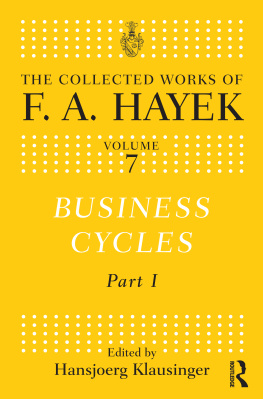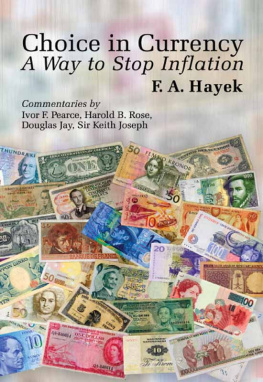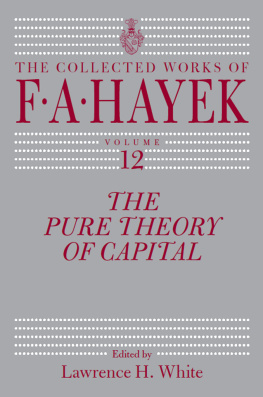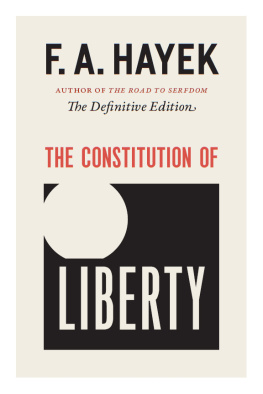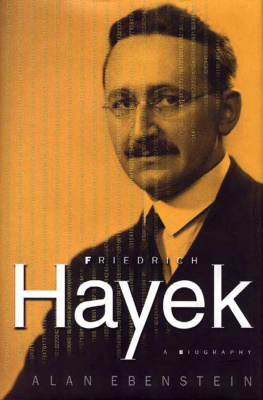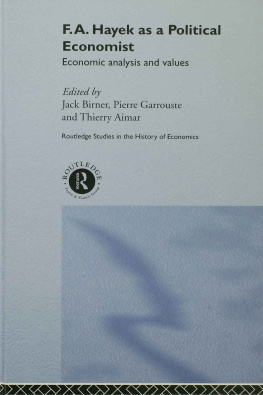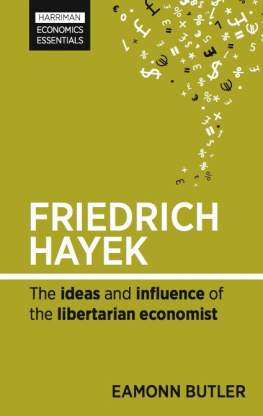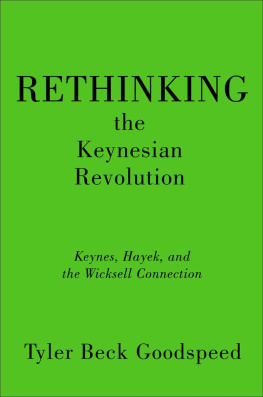THE COLLECTED WORKS OF
F. A. Hayek
VOLUME VII
BUSINESS CYCLES
Part I
PLAN OF THE COLLECTED WORKS
Edited by Bruce Caldwell
Volume I | The Fatal Conceit: The Errors of Socialism (1988) |
Volume II | The Road to Serfdom: Text and Documents (2007) |
Volume III | The Trend of Economic Thinking: Essays on Political Economists and Economic History (1991) |
Volume IV | The Fortunes of Liberalism: Essays on Austrian Economics and the Ideal of Freedom (1992) |
Volume V | Good Money, Part I: The New World (1999) |
Volume VI | Good Money, Part II: The Standard (1999) |
Volume VII | Business Cycles, Part I |
Volume VIII | Business Cycles, Part II |
Volume IX | Contra Keynes and Cambridge: Essays, Correspondence (1995) |
Volume X | Socialism and War: Essays, Documents, Reviews (1997) |
Volume XI | Capital and Interest |
Volume XII | The Pure Theory of Capital (2007) |
Volume XIII | Studies on the Abuse and Decline of Reason: Text and Documents (2010) |
Volume XIV | The Sensory Order and Other Essays |
Volume XV | The Market and Other Orders |
Volume XVI | John Stuart Mill and Harriet Taylor |
Volume XVII | The Constitution of Liberty: The Definitive Edition (2011) |
Volume XVIII | Essays on Liberty |
Volume XIX | Law, Legislation and Liberty |
Supplement | Hayek on Hayek: An Autobiographical Dialogue (1994) |
The plan is provisional. Minor alterations may occur in titles of individual books, and several additional volumes may be added. |

THE COLLECTED WORKS OF
F. A. Hayek
VOLUME VII
BUSINESS CYCLES
Part I
EDITED BY
HANSJOERG KLAUSINGER

F. A. HAYEK (18991992), recipient of the Presidential Medal of Freedom in 1991 and cowinner of the Nobel Memorial Prize in Economics in 1974, was a pioneer in monetary theory and a leading proponent of classical liberalism in the twentieth century.
BRUCE CALDWELL is research professor of economics and director of the Center for the History of Political Economy at Duke University. He has edited many books in the Collected Works of F. A. Hayek, including The Road to Serfdom. He is also the author of Hayek's Challenge: An Intellectual Biography of F.A. Hayek (University of Chicago Press, 2004).
HANSJOERG KLAUSINGER is associate professor in the Department of Economics at WU Vienna University of Economics and Business. He has published numerous articles on the history of Austrian economics.
First published 2013
by Routledge
2 Park Square, Milton Park, Abingdon, Oxon OX14 4RN
Routledge is an imprint of the Taylor & Francis Group, an informa business
2013 The Estate of F. A. Hayek
All rights reserved. No part of this book may be reprinted or reproduced or utilised in any form or by any electronic, mechanical, or other means, now known or hereafter invented, including photocopying and recording, or in any information storage or retrieval system, without permission in writing from the publishers.
Trademark notice: Product or corporate names may be trademarks or registered trademarks, and are used only for identification and explanation without intent to infringe.
British Library Cataloguing in Publication Data
A catalogue record for this book is available from the British Library
ISBN: 978-0-415-64115-9
THE COLLECTED WORKS OF F. A. HAYEK
Founding Editor: W. W. Bartley III
General Editor: Bruce Caldwell
Published with the support of
The Hoover Institution on War, Revolution, and Peace
Stanford University
The Cato Institute
The Earhart Foundation
The Pierre F. and Enid Goodrich Foundation
The Heritage Foundation
The Morris Foundation, Little Rock
CONTENTS
Although in my home country of Austria, Friedrich August Hayek, both as the economist and as the social philosopher, for a long time had not been recognised as a major thinker of the twentieth century, in some sense his works, first and foremost his writings on money and the cycle, were always present during my endeavours as a scholar in the history of economic thought. My first encounter with Hayek's works was when a colleague, Norbert Hentschel, to whom I am still grateful, proposed a discussion of Hayek's theory of the cycle as a theme for a doctoral thesisa suggestion which I did not follow then, but ten years later when I chose to make a chapter on Hayek part of my habilitation. From then on my interest in Hayek never receded, and in this regard I now feel much honoured by the opportunity to present this edition of Hayek's writings on the business cycle.
The first part, in this volume, contains Hayek's two major monographs on the business cycle, Monetary Theory and the Trade Cycle and Prices and Production, while his short papers, including hitherto unpublished contributions, are collected in a companion volume (Business Cycles, Part II ). The editorial history of both monographs necessitated the specific procedure chosen here. Monetary Theory and the Trade Cycle (1933) is the revised translation from the German Geldtheorie und Konjunkturtheorie (1929), a translation not free from shortcomings in some regards, which was highlighted recently by a novel translation of what had been in effect a preprint of the first three chapters of this monograph. Thus, in addition to reproducing the text of the 1933 translation, this edition will draw on the original German version and make use of the more recent translation for pointing out divergenceswhatever their causesbetween the German and the English text. Prices and Production was published first in 1931, in English, and then in a revised second edition in 1935; shortly after the first edition Hayek produced a German version, Preise und Produktion (1931). In the present volume the text will be presented as a variorum edition, based on the revised second edition and noting all deviations from the first. Where it furthers the understanding of the evolution of Hayek's thought, this edition will also supply variants taken from the German version.
Apart from this, a main task for the editor consisted in the checking of references and quotations. Here the principles of the Collected Works editions have been maintained with some slight modifications: The reference style keeps to the rule of citing the full reference at the first quotation and abbreviated references at the following instances, yet with the modification that the editor's introduction and the two monographs are treated as self-contained parts to which this rule applies separately. Typing errors and obvious mistakes have been silently corrected throughout; similarly, the references have been silently adapted to the style of this edition. Inaccurate quotations in Hayek's original version have been left uncorrected, with the inaccuracies pointed out differently according to whether they appear in the text or in the footnotes: inaccurate quotations in the text are pointed out in accompanying editorial notes; those in the footnotes are corrected by the use of brackets. And although incomplete references given by Hayek have been silently supplemented, brackets are used to correct references that are definitely wrong, for example, as regards the author's name, title, or pagination. Finally, if no other source is indicated, German-language writings have been translated by the editor.

